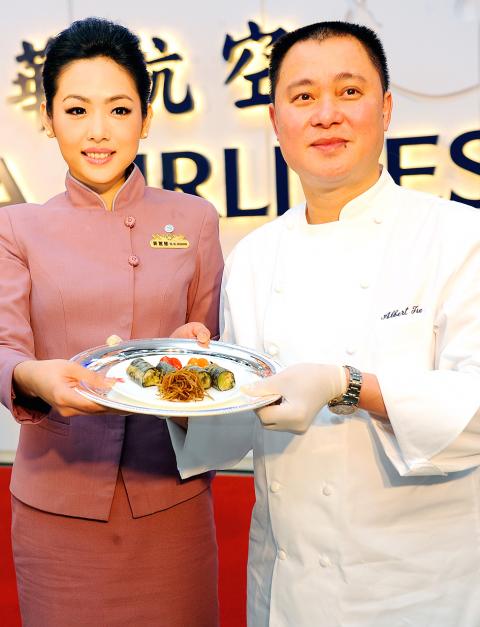China Airlines Ltd (CAL, 中華航空), the nation’s largest air carrier, said yesterday it would start offering Chinese meals created by Michelin starred chef Albert Tse (謝偉成) to its first and business-class passengers from this month on some routes.
The meal will be offered to first-class passengers on Taipei-Los Angeles or Taipei-San Francisco flights, and business-class passengers on Taipei-Tokyo, Tokyo-Honolulu and Kaohsiung-Tokyo routes, the company said.
Tse, a Hong Kong native, designed the meals based on the signature dish of Tokyo’s China Blue Restaurant, which he has led for five years, the airline said.

Photo: Chang Chia-ming, Taipei Times
AWARD WINNING
The restaurant has been awarded a Michelin star for the past five years, the airline said.
CAL has launched several in-flight meals in cooperation with a variety of local restaurants, such as Mos Burger (摩斯漢堡), Formosa Chang (鬍鬚張), Shanghai Shanghai (紅豆食府) and Taiwanese award-winning baker Wu Pao-chun (吳寶春) since 2009.
BOND SALE
In other news, CAL said yesterday that its board has approved a plan to sell up to NT$6 billion (US$198.06 million) in three-year corporate bonds to help repay loans and boost operating capital.
The bonds will be issued in denominations of NT$1 million each, with the issuing rate standing at 2 percent annually, the company said in a statement to the Taiwan Stock Exchange.

POWERING UP: PSUs for AI servers made up about 50% of Delta’s total server PSU revenue during the first three quarters of last year, the company said Power supply and electronic components maker Delta Electronics Inc (台達電) reported record-high revenue of NT$161.61 billion (US$5.11 billion) for last quarter and said it remains positive about this quarter. Last quarter’s figure was up 7.6 percent from the previous quarter and 41.51 percent higher than a year earlier, and largely in line with Yuanta Securities Investment Consulting Co’s (元大投顧) forecast of NT$160 billion. Delta’s annual revenue last year rose 31.76 percent year-on-year to NT$554.89 billion, also a record high for the company. Its strong performance reflected continued demand for high-performance power solutions and advanced liquid-cooling products used in artificial intelligence (AI) data centers,

SIZE MATTERS: TSMC started phasing out 8-inch wafer production last year, while Samsung is more aggressively retiring 8-inch capacity, TrendForce said Chipmakers are expected to raise prices of 8-inch wafers by up to 20 percent this year on concern over supply constraints as major contract chipmakers Taiwan Semiconductor Manufacturing Co (TSMC, 台積電) and Samsung Electronics Co gradually retire less advanced wafer capacity, TrendForce Corp (集邦科技) said yesterday. It is the first significant across-the-board price hike since a global semiconductor correction in 2023, the Taipei-based market researcher said in a report. Global 8-inch wafer capacity slid 0.3 percent year-on-year last year, although 8-inch wafer prices still hovered at relatively stable levels throughout the year, TrendForce said. The downward trend is expected to continue this year,

Vincent Wei led fellow Singaporean farmers around an empty Malaysian plot, laying out plans for a greenhouse and rows of leafy vegetables. What he pitched was not just space for crops, but a lifeline for growers struggling to make ends meet in a city-state with high prices and little vacant land. The future agriculture hub is part of a joint special economic zone launched last year by the two neighbors, expected to cost US$123 million and produce 10,000 tonnes of fresh produce annually. It is attracting Singaporean farmers with promises of cheaper land, labor and energy just over the border.

A proposed billionaires’ tax in California has ignited a political uproar in Silicon Valley, with tech titans threatening to leave the state while California Governor Gavin Newsom of the Democratic Party maneuvers to defeat a levy that he fears would lead to an exodus of wealth. A technology mecca, California has more billionaires than any other US state — a few hundred, by some estimates. About half its personal income tax revenue, a financial backbone in the nearly US$350 billion budget, comes from the top 1 percent of earners. A large healthcare union is attempting to place a proposal before